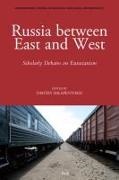Share
Fr. 213.60
Dmitry Shlapentokh
Russia between East and West - Scholarly Debates on Eurasianism
English · Paperback / Softback
Shipping usually takes at least 4 weeks (title will be specially ordered)
Description
Throughout most of Russian history, two views of who the Russians are have dominated the minds of Russian intellectuals. Westerners assumed that Russia was part of the West, whilst Slavophiles saw Russia as part of a Slavic civilization. At present, it is Eurasianism that has emerged as the paradigm that has made attempts to place Russia in a broad civilizational context and it has recently become the only viable doctrine that is able to provide the very ideological justification for Russia's existence as a multiethnic state. Eurasians assert that Russia is a civilization in its own right, a unique blend of Slavic and non-Slavic, mostly Turkic, people.
While it is one of the important ideological trends in present-day Russia, Eurasianism, with its origins among Russian emigrants in the 1920s, has a long history. Placing Eurasianism in a broad context, this book covers the origins of Eurasianism, dwells on Eurasianism's major philosophical paradigms, and places Eurasianism in the context of the development of Polish and Turkish thought. The final part deals with the modern modification of Eurasianism. The book is of great relevance to those who are interested in Russian/European and Asian history area studies.
List of contents
Acknowledgments
Introduction: Eurasianism and Soviet/Post-Soviet Studies
Dmitry Shlapentokh
Bibliography
Chapter I: The Orient in Russian Thought at the Turn of the Century
Marlène Laruelle
The Genesis of Eurasianism
The Turn of the Century, or the Crystallization of Discourse on the Orient
Orientalist Mysticism and Theosophy in Russia
Vladimir Soloviev and the Idea of Totality (Vseedinstvo)
The Inheritance of Pan-Slavism: "Civilizationism" and Its Assumptions
The Idea of a Third Continent: The Geographical Mission of Russia in the Orient
The Orientals Movement (Vostochniki)
The Mongolian Wave: The Orient and Eschatology
Eschatology Reviewed by the Revolutionary Prism
A New Orient to Which Revolutionary Russia Belongs
The Ambiguity of the Pre-revolutionary Russian Appeal to the Orient
The Genesis of Eurasianism before the Revolution
The Eurasianists' Orientalism and Its Limits
Conclusion
Bibliography
Chapter II: Eurasianism as a Reaction to Pan-Turkism 39
Stephan Wiederkehr
Pan-Turkism Threatening the Russian Empire?
Pan-Turkism and Modernization of Russia's Muslim
Turks: The Emergence of Pan-Turkism in Russia
Pan-Turkism in the Ottoman Empire
World War I, the Russian Revolutions, and Afterward
Contemporary Perceptions of Pan-Turkism in the First
Quarter of the Twentieth Century
Eurasian Nation-Building against the Challenge of Pan-Turkism: The Eurasian Perception of Pan-Turkism
"True" and "False" Nationalism The Eurasian Point of View
Conclusion
Bibliography
Chapter III: Karsavin and the Eurasian Movement
Franoise Lesourd
Eurasian C onnections
Separation from the Eurasian Movement
Soviet Experience
Russian Culture and Religion
Theory of Culture
Revolution
The New Russian State
Conclusion
Bibliography
Chapter IV: Absolutism and Authority in Eurasian Ideology: Karsavin and Alekseev
Ryszard Paradowski
Karsavin's Philosophy
Theory of the State
Alekseev and the Eurasians
Bibliography
Chapter V: From Rejection to Attempts at Reconciliation: Poles and the Interwar Eurasian Movement
Roman Barker
Interwar Russian Emigration and Polish Public Opinion
Interest in Eurasianism in Poland
Kazimierz Czapifiski
Manan Zdziechowski
Manan Uzdowski
Petr Savitskii and Przeglad Wspolczesny
Polish Secret Service: Naive Illusions and Brutal Assessments
Poles and Eurasians, Interests and Stereotypes
Bibliography
Chapter VI: Anti-Semitism in Eurasian Historiography: The Case of Lev Gumilev
Vadim Rossman
The Jews in Ethnic History
Judeo-Khazaria: "A Disaster for the Aboriginals of Eastem Europe"
Judaism in Relation to Christianity and Islam
Judeo-Khazaria and Russia
The Jews and the Nomads: The Khazar Origins of the Eastern European Jews
Discussion of Gumilev's Theory by Russian Nationalists
Neo-Eurasianism: Leviathan, Behemoth, and the Jews
The "Jewish Question" in Classical Eurasianism
The Jews in Neo-Eurasianism
Anacus and Hostis: Fax Euroasiatica and Its Mystical Antipode
Eurasianism versus Atlanticism
Tradition and Counter-Tradition
The Jews and the Crisis of the Modern World
The "Enlightened" Science of Conspirology
Nuremberg versus Auschwitz
The Muslim World, Israel, and the Conservative Revolution
Bibliography
Conclusion
Diniky Shlapentokh
Bibliography
Index
Product details
| Assisted by | Dmitry Shlapentokh (Editor) |
| Publisher | Brill |
| Languages | English |
| Product format | Paperback / Softback |
| Released | 13.06.2008 |
| EAN | 9789004154155 |
| ISBN | 978-90-0-415415-5 |
| No. of pages | 198 |
| Weight | 378 g |
| Series |
International Studies in Socio |
| Subjects |
Humanities, art, music
> History
Social sciences, law, business > Social sciences (general) |
Customer reviews
No reviews have been written for this item yet. Write the first review and be helpful to other users when they decide on a purchase.
Write a review
Thumbs up or thumbs down? Write your own review.

